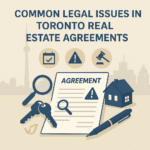Navigating the Legal Maze: How to Contest a Will and Protect Your Interests

Introduction
Losing a loved one is undoubtedly one of life’s most challenging experiences. However, when disputes arise over the deceased’s last will and testament, the emotional toll can be compounded by legal complexities. Contesting a will is a sensitive and intricate process that requires careful navigation of the legal maze. In this blog, we’ll explore how to contest a will and protect your interests.
Understanding the Basics
Before diving into the process, it’s essential to grasp the basics of will contests. A last will and testament is a legal document that outlines how a person’s assets should be distributed upon their death. To contest a will means to challenge its validity or the distribution of assets mentioned within it. Some common grounds for contesting a will include:
- Lack of Capacity: If the testator (the person who created the will) was not of sound mind at the time of creating the will, it could be considered invalid.
- Undue Influence: If someone exerted undue influence over the testator, coercing them into making specific bequests or changes to the will, it may be contested.
- Forgery or Fraud: If there is evidence of forgery or fraud in the creation or execution of the will, it can be challenged.
- Mistakes or Ambiguities: Wills with unclear or contradictory language may be contested to clarify the testator’s intentions.
Seek Legal Counsel
Contesting a will is a complex legal process, and it’s essential to seek the advice of an experienced estate litigation lawyer. At Levy Zavet Lawyers, our team of experts specializes in estate disputes and can provide you with the guidance needed to protect your interests.
The Legal Process
- Initial Assessment: Your lawyer will assess the merits of your case, review the will in question, and gather evidence to support your claim.
- Mediation or Negotiation: In some cases, disputes can be resolved through mediation or negotiation, avoiding lengthy court battles. Your lawyer will advise you on the best course of action.
- Filing a Claim: If mediation is unsuccessful, your lawyer will help you file a claim in court, outlining the grounds for contesting the will.
- Discovery and Evidence Gathering: Both parties will exchange evidence and documents related to the case. Witnesses may be interviewed, and financial records reviewed.
- Trial: If the dispute remains unresolved, the case will proceed to trial, where both parties will present their arguments, and the judge will make a decision.
- Appeal: If either party disagrees with the trial outcome, they may choose to appeal the decision.
Protecting Your Interests
During this challenging time, it’s crucial to prioritize your interests and well-being:
- Maintain Communication: Keep lines of communication open with other interested parties, if possible, to explore amicable resolutions.
- Gather Evidence: Work closely with your lawyer to gather all relevant evidence, documents, and witnesses to support your case.
- Manage Emotions: Emotions can run high during will contests. Lean on the support of friends, family, or a therapist to help you navigate the emotional toll.
- Stay Informed: Trust your legal counsel to guide you through the process, but also take the time to educate yourself about the legal aspects of your case.
- Consider Settlement: Be open to settlement discussions if they are in your best interest. Settling can save time, money, and emotional distress.
Conclusion
Contesting a will can be a challenging and emotionally charged process. However, with the guidance of experienced legal professionals like those at Levy Zavet Lawyers in Toronto, you can navigate the legal maze and protect your interests. Remember that every case is unique, and the best approach will depend on the specific circumstances. If you find yourself in such a situation, consult with a reputable estate litigation lawyer to explore your options and ensure that your interests are well represented. The experts at Levy Zavet offers free consultations to get you started.
For more information on our estate litigation services, please visit Levy Zavet Lawyers – Estate Litigation.
For additional resources on estate planning and wills, you can also visit Levy Zavet Lawyers – Estate Planning.
Read More: Challenging a Will in Ontario


